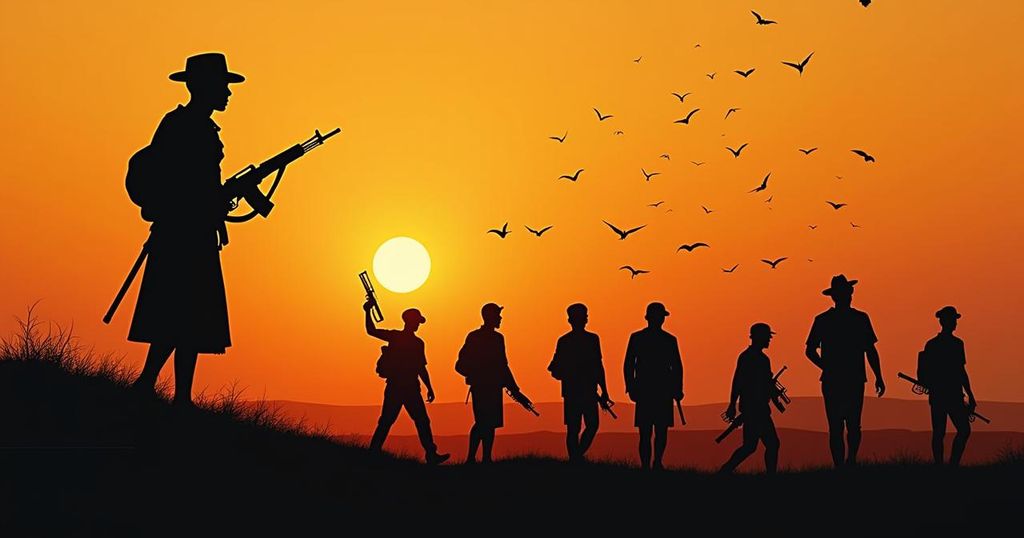Four Years After Mali’s Coup: The Ripple Effect on West Africa’s Political Landscape
Since the military coup in Mali in August 2020, West Africa has experienced wave of coups and political instability, with over ten attempts recorded in four years. Initially spurred by dissatisfaction with civilian governance, this trend has seen military leaders take decisive control across countries like Guinea, Burkina Faso, and Niger. Amid growing resentment towards former colonial powers and shifting allegiances towards Russia for support, the region is grappling with increased violence and worsening security situations.
The military coup in Mali, which occurred in August 2020, marked a significant turning point in West Africa’s political landscape. It initiated a series of coup attempts throughout Central and West Africa that have not been seen since the late 20th century. Following weeks of protests against then-President Ibrahim Boubacar Keïta, who faced accusations of corruption and mismanagement of an armed insurgency, Malian soldiers took decisive action by arresting Keïta and taking control of the nation. This event was not merely a domestic shift; it triggered a surge of political instability across the region, resulting in over ten coup attempts in neighboring countries since the Mali coup. The ripple effect of the Mali coup is evident in subsequent military takeovers in countries like Guinea, Burkina Faso, and Niger. Each of these incidents reflects both popular dissatisfaction with civilian governments and a growing trend of military intervention under the pretext of restoring order and addressing security crises. For instance, the coup in Guinea saw President Alpha Condé ousted amid widespread protests against his attempts to extend his presidency, while in Burkina Faso, mounting insecurity from armed groups compelled military intervention against President Roch Marc Christian Kaboré. Colonel Assimi Goita, the figure behind Mali’s coup, subsequently navigated a complex political landscape, initially sharing power with a civilian president before asserting full control. His decisions have extended military rule and delayed elections, reflecting a broader pattern of military leaders consolidating power in the region. This trend has unfurled further coups, including in Niger and Gabon, as the perception of military governance grows more favorable among the populace, particularly amid widespread discontent with current civilian leaders. The socio-political climate in West Africa is exacerbated by the withdrawal of foreign military forces, especially from France, as many military regimes pivot towards Russian support. This shift illustrates a robust rejection of traditional colonial influences and a search for new partnerships. However, the transition to military rule has not brought about the stability or security that populations desire, evidenced by escalating violence and human rights abuses reported across Mali, Burkina Faso, and Niger.
The 2020 military coup in Mali catalyzed significant upheaval across Central and West Africa, reigniting a trend of military intervention that had largely faded after decades of political stabilization. Prior to 2020, the region had enjoyed a relatively stable environment, free from coups since the early 2010s. However, the coup not only disrupted Mali’s political landscape but also facilitated a broader pattern of governance challenges, crises of legitimacy in civilian rule, and an alarming rise in violence and insurgency. The involvement of regional bodies like ECOWAS and the rising influence of external actors like Russia also play crucial roles in shaping the current dynamics within the region’s political arena.
In conclusion, the military coup in Mali four years ago has proven to be a pivotal moment for West Africa, instigating a wave of upheaval characterized by over ten coup attempts across the region. This shift has underscored the fragility of civilian governance and the increasing reliance on military solutions to complex socio-political issues. As military leaders consolidate power and external influences shift, the prospects for democratic resurgence remain grim, raising pressing questions about regional stability and governance moving forward.
Original Source: www.aljazeera.com




Post Comment